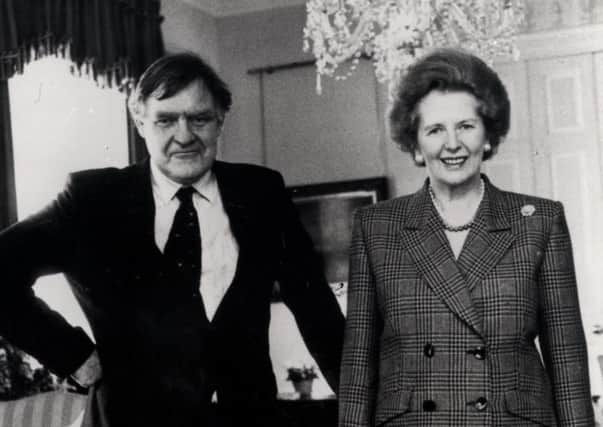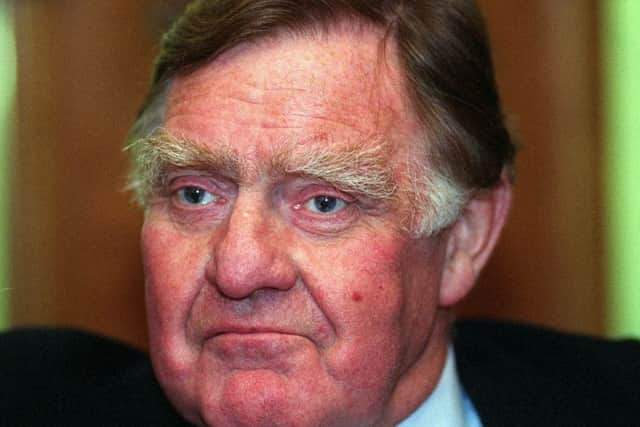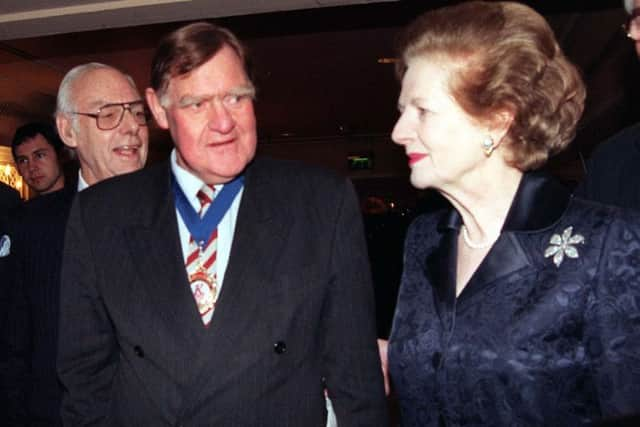Why Margaret Thatcher stayed in power for too long as Sir Bernard Ingham publishes his diaries – Tom Richmond


SIR Bernard Ingham is sitting in an armoured car with Margaret Thatcher as they are driven at high speed from 10 Downing Street to RAF Northolt to begin a Prime Ministerial visit to Scotland.
Why Britain needs a Winston Churchill-like figure to see us through this dark hour – Tom RichmondOnce described as her “rough-spoken Yorkshire Rasputin” by one-time Minister John Biffen, he is bristling with indignation after Sir Edward Heath, a former PM, accused Downing Street of corruptly exploiting the Press.
Advertisement
Hide AdAdvertisement
Hide AdMeanwhile Mrs Thatcher is simmering with anger over the “disgraceful” remark, offering to write to the man she toppled to become Tory leader to demand a retraction.


Margaret Thatcher’s five best qualities are what Britain needs now and here’s why – Bernard InghamHer chief Press secretary tells her not to waste her time because he had already been called “a menace to the constitution” by their nemesis. “To which I retorted ‘Well, he should know. He abolished Yorkshire in 1974 and that was a very unconstitutional thing to do,” Sir Bernard, a proud son of Hebden Bridge, regales to The Yorkshire Post.
My life with the Iron Lady 40 years on and what it was like to work for Margaret Thatcher – Bernard InghamHe’s not forgotten the encounter in early 1989 because it effectively came at the beginning of the end of the Thatcher premiership.
Fiercely loyal to her closest staff, and still steadfast as a leader, her vulnerability, 10 years after becoming Britain’s first female PM, was beginning to show and is now chronicled in Sir Bernard Ingham’s new diaries, The Slow Downfall of Margaret Thatcher, from January 1989 to December 1990.
Advertisement
Hide AdAdvertisement
Hide AdA period in political history that Sir Bernard likens to “a long, slow assassination”, he believes it would have been preferable if Mrs Thatcher had stood down on the 10th anniversary of her first election win.


As his compelling diaries also reveal, the parallels between then and now as Theresa May is forced out of office by her MPs are profound. Threats of Ministerial resignations by senior Government ministers; Tory losses in European Parliament elections and a President of the United States – George Bush senior – visiting London.
As Sir Bernard’s diaries for June 2019 begin: “The big question of the day is whether we are the best friends of the USA.”
Advertisement
Hide AdAdvertisement
Hide Ad“What difference?” he poses. “The Tory party was split then over Europe and the party is today split over Brexit which is economic policy. There are the wets and the dries. Nothing has changed – the Tory party is still the worst enemy of their Prime Minister.”
Yet Sir Bernard concedes that Mrs Thatcher went on for too long. “I think there is a case for saying, and Denis (Thatcher) said it, if she had gone after 10 years, she would have gone on her own terms rather than being kicked out,” he told The Yorkshire Post.
“I don’t think being kicked out has done any damage to her reputation. It has done more damage to the Tory party. Leaving aside all the economic and other troubles over 10 years, you have fired a lot of people, you haven’t promoted people as far as they would like to go and you have ignored some people. That creates a sense of disgruntlement and desire for change.”
There was another reason Mrs Thatcher clung to power. “She didn’t think John Major was ready and she had identified him as her likely successor,” Sir Bernard disclosed. “I don’t think she realised he was as soft as he turned out to be. He became all things to all people but I got on with him extremely well as Chief Secretary, Foreign Secretary and Chancellor.”
Advertisement
Hide AdAdvertisement
Hide AdThere are, nevertheless, moments of levity like “the last-minute failure” of the photocopier just as Sir Bernard is about to announce a far-reaching reshuffle in July 1989 that saw Foreign Secretary Sir Geoffrey Howe demoted. “Technology. Grr,” he writes.
Or more problems with technology on a bullet train in Japan when he presses the wrong button and gets “sprayed by the built-in bidet” all down his front. Sir Bernard laughs at himself now: “I did make a mess of myself. I don’t know how I managed to cover it up,” he says.
His office was adorned with paintings by Mytholmroyd artist Donald Crossley but the exhausting schedule also too its toll. At weekends, Sir Bernard would monitor newspapers, go for a walk in the country with his late wife Nancy and watch sport – rugby league and racing – between sleep. He was constantly on call to a PM who he described as his boss, colleague and friend.
Yet, while the Government’s strains with the media, and Tory dissenters, are laid bare, there are revealing vignettes. Sir Bernard rubbished reports that the Government was inviting bids for British Rail. “Who would buy the railways?” he pondered.
Advertisement
Hide AdAdvertisement
Hide AdThis on the day of a lunch with his fellow Yorkshireman Alastair Campbell, political editor of the then Today newspaper before becoming Tony Blair’s Press chief. “He was never going to write anything good about Mrs Thatcher but there was no reason to fall out with him. He was perfectly okay as a journalist,” said Sir Bernard.
As tensions over European integration coincided with plans to introduce the community charge – Sir Bernard notes on a return to his native Hebden Bridge that ‘no poll tax’ posters are in ‘the messier part of town’ – he still rejects the view that the Government was out of touch.
He says Mrs Thatcher still held constituency surgeries, undertook major TV interviews and travelled across the UK. He also made sure the regional media had regular access to the PM. He regrets that this has been discontinued and says the next PM should revive such meetings.
“Damn it, I was giving her a Press digest every morning with the good, bad and indifferent,” he says with added emphasis. “There would have been no point doing it if I only gave her good news.”
Advertisement
Hide AdAdvertisement
Hide AdIn response to serial critics like the aforementioned Sir Edward Heath, he stresses that his job was to present Government policy and he never compromised the neutrality of the Civil Service. Yet these 9am daily briefings became part of Sir Bernard’s life and he was one of the first to learn of the PM’s resignation. She was tearful. He was saddened but not surprised. “To be honest I had seen it coming and I was getting pretty worn out. I didn’t realise how worn out I was until I stopped. And I suspect the same of her.”
Looking back, Sir Bernard is relieved that Mrs Thatcher, and himself, were spared trial by social media. “I think public life has steadily coarsened and she wasn’t coarse,” he ventures.
“Denis Thatcher once rebuked me when I listed her leadership qualities. He said I had forgotten the most important one – her deep religious conviction that came from her Methodism in Grantham.
“I think she would have faced an awful lot of abuse from social media. The Labour Party wasn’t the Labour Party it is today. And I’m rather glad I didn’t have a mobile phone, computer or the internet. Life was more civilised.”
Advertisement
Hide AdAdvertisement
Hide AdThe Slow Downfall of Margaret Thatcher: The Diaries of Bernard Ingham are published by Biteback, price £20.
SIR Bernard Ingham’s diaries reveal that he was approached twice in the early part of 1989 about the possibility of succeeding John Edwards as editor of The Yorkshire Post.
“At least twice and I had committed myself to stay at Number 10 (Downing Street),” he said. “It came after I became head of the Government Information Service. It would have been a blow to the GIS if I immediately wandered off.”
An esteemed Labour Correspondent for the Yorkshire Post, covering trade unions, in his early career as a journalist, and still a forthright weekly columnist as he approaches his 87th birthday later this week, he added: “I would liked to have done it. “Regret? I think I was a peg in a round hole where I was.”